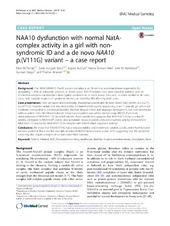NAA10 dysfunction with normal NatA-complex activity in a girl with non-syndromic ID and a de novo NAA10 p.(V111G) variant - a case report
Mc Tiernan, Nina; Støve, Svein Isungset; Aukrust, Ingvild; Mårli, Marita Torrissen; Myklebust, Line Merethe; Houge, Gunnar; Arnesen, Thomas
Peer reviewed, Journal article
Published version

Åpne
Permanent lenke
https://hdl.handle.net/1956/23602Utgivelsesdato
2018Metadata
Vis full innførselSamlinger
Originalversjon
https://doi.org/10.1186/s12881-018-0559-zSammendrag
Background: The NAA10-NAA15 (NatA) protein complex is an N-terminal acetyltransferase responsible for acetylating ~ 40% of eukaryotic proteins. In recent years, NAA10 variants have been found in patients with an X-linked developmental disorder called Ogden syndrome in its most severe form and, in other familial or de novo cases, with variable degrees of syndromic intellectual disability (ID) affecting both sexes. Case presentation: Here we report and functionally characterize a novel and de novo NAA10 (NM_003491.3) c.332 T > G p.(V111G) missense variant, that was detected by trio-based whole exome sequencing in an 11 year old girl with mild/moderate non-syndromic intellectual disability. She had delayed motor and language development, but normal behavior without autistic traits. Her blood leukocyte X-inactivation pattern was within normal range (80/20). Functional characterization of NAA10-V111G by cycloheximide chase experiments suggests that NAA10-V111G has a reduced stability compared to NAA10-WT, and in vitro acetylation assays revealed a reduced enzymatic activity of monomeric NAA10-V111G but not for NAA10-V111G in complex with NAA15 (NatA enzymatic activity). Conclusions: We show that NAA10-V111G has a reduced stability and monomeric catalytic activity, while NatA function remains unaltered. This is the first example of isolated NAA10 dysfunction in a case of ID, suggesting that the syndromic cases may also require a degree of compromised NatA function.
